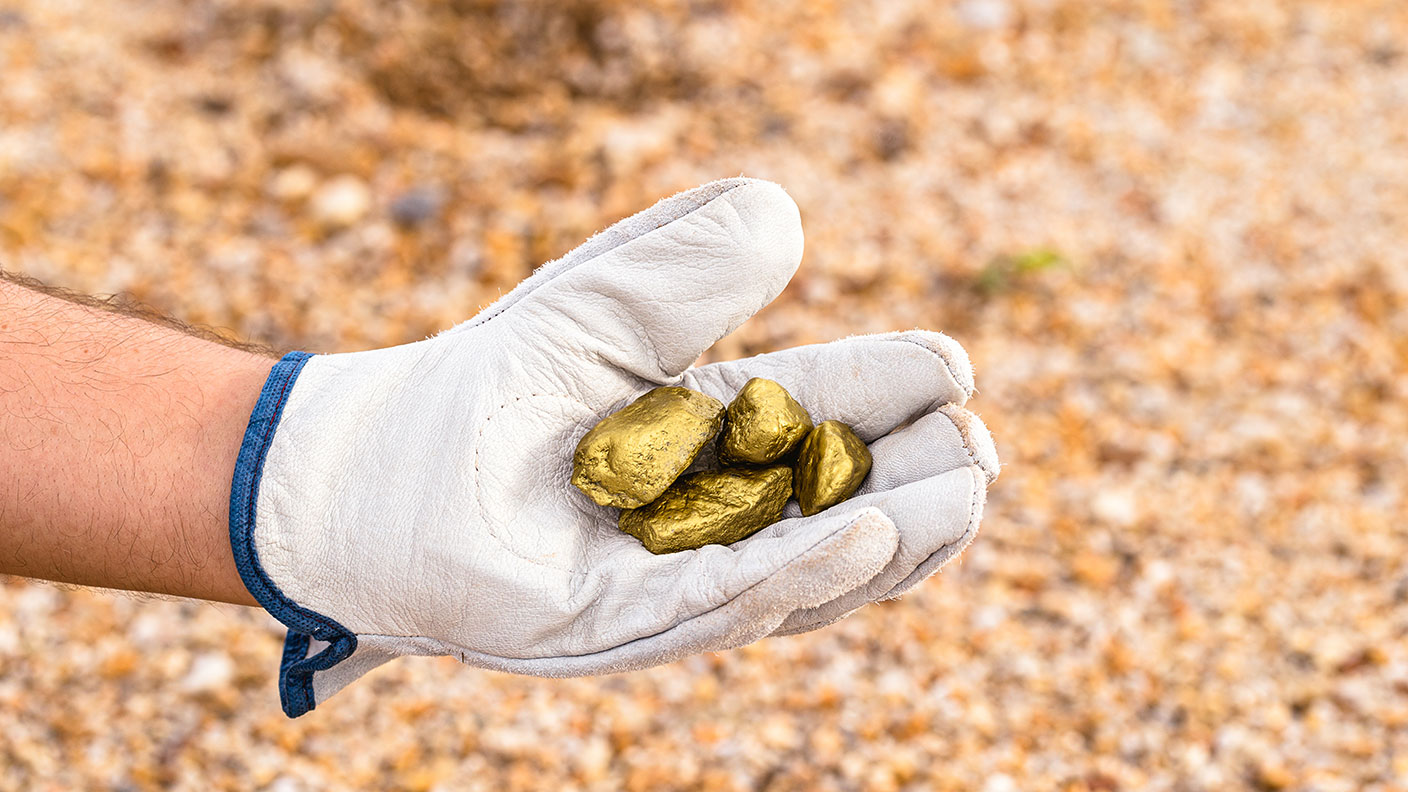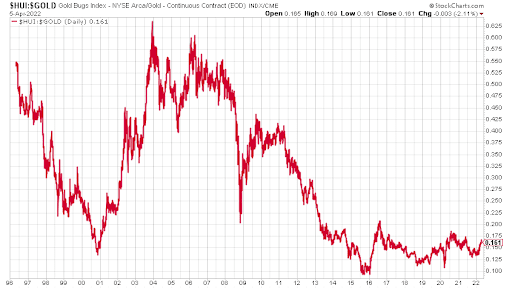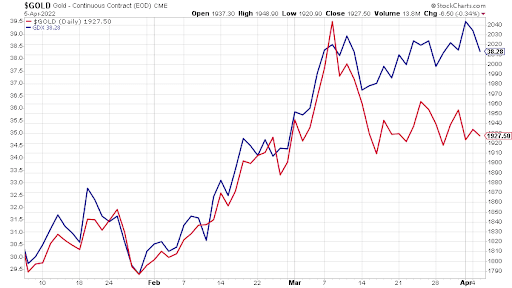Are gold miners finally set to outperform plain old gold?
Gold miners are meant to outperform gold. Yet since 2003, that hasn’t been the case. What’s changed – and will they ever make a comeback? Dominic Frisby explains.


Get the latest financial news, insights and expert analysis from our award-winning MoneyWeek team, to help you understand what really matters when it comes to your finances.
You are now subscribed
Your newsletter sign-up was successful
Want to add more newsletters?

Twice daily
MoneyWeek
Get the latest financial news, insights and expert analysis from our award-winning MoneyWeek team, to help you understand what really matters when it comes to your finances.

Four times a week
Look After My Bills
Sign up to our free money-saving newsletter, filled with the latest news and expert advice to help you find the best tips and deals for managing your bills. Start saving today!
“Look at what they do, not at what they say.”
If you are seeking truth of any kind, this is a great maxim to live by - particularly when it comes to politicians. And lovers.
My advice today is to apply the maxim to your author, because there is a marked divergence between what I say on the subject of gold mining companies and what I actually do.
MoneyWeek
Subscribe to MoneyWeek today and get your first six magazine issues absolutely FREE

Sign up to Money Morning
Don't miss the latest investment and personal finances news, market analysis, plus money-saving tips with our free twice-daily newsletter
Don't miss the latest investment and personal finances news, market analysis, plus money-saving tips with our free twice-daily newsletter
We’ll start with what I say…
Here’s why everyone believes that gold miners are a leveraged play on gold
Talk to any grizzled goldbug who remembers the 1930s – there must be one or two that were there – and one or two more that have read about them. In the US, the story went as follows.
After the stock market crash of 1929, the US sunk into an economic recession that became known as the Great Depression. In order to fund a government stimulus programme, the President, Franklin D Roosevelt, confiscated his citizens’ gold.
It became illegal for Americans to own gold. Like the loyal citizens they were, Americans handed their gold in and the authorities gave them dollars in exchange at the official exchange rate of $20 per ounce.
Roosevelt then devalued those dollars by 40%. The official price of gold would now be $35 per ounce.
Some moaned, while many didn’t notice, but the cannier folk thought: “We might not be able to own gold, but we can own gold mining companies – and their profit margins have just gone bananas.”
Homestake was the biggest gold miner in North America at the time. Its share price multiplied many times over. It became the investment of the decade.
Fast forward to the 1970s, a decade which policy-makers seem intent on re-living in some kind of Black Mirror parallel universe situation. Inflation was rampant, money was debased, the gold standard was abandoned and there was an energy crisis. The decade ended with Russia invading a neighbouring country, in this case Afghanistan.
Gold went from $35 to (briefly) $850 over the course of the decade. But gold miners – whoosh. They multiplied and multiplied and multiplied. They were the investment of the decade.
Thus has it been implanted in our psyche that gold miners give you leverage to the gold price. When gold goes up, gold miners go up by more.
Except they don’t.
Gold miners have been terrible investments compared to boring old gold
Here we now present Exhibit A, which is the ratio between the HUI, the index of unhedged gold miners, and gold since the mid-1990s.
The chart has been falling since late 2003. In other words, gold has been outperforming gold shares. Apart from odd bouts of outperformance, this has been the case for more than 15 years now.

Barrick, off and on the world’s largest gold mining company, has had a good couple of years since it changed management. Even so, it is still trading at the same price it was in 2005. Gold was selling for less than $500 an ounce in 2005. It’s $1,900 now.
In 2018, Barrick was trading at the same price it was in 2001. In 2001, gold was $250.
In other words, what has been the point of owning gold miners, when you could simply have owned gold? And some would argue what is the point of gold, when you can own bitcoin?
The reason, in my view, aside from a proliferation of incompetence among management, is that, starting in around about 2003, when that chart peaked, we saw a plethora of different ways by which ordinary investors could buy and hold gold.
Aside from taking delivery of bullion itself, we saw the rise of online storage companies – Goldmoney, Bullion Vault, Goldcore and so on. The exchange traded funds (ETFs), by which investors and institutions could buy and hold gold via a broker, came into existence. Cheap online brokers became commonplace. If you wanted something a bit racier, there were spreadbets, futures, CFDs, covered warrants, leveraged ETFs and more.
They made the gold miner’s role as the levered way to play gold even more redundant.
Has that changed? No. It’s very hard to intellectually justify owning a gold miner in the face of the above. So that is what I say.
But what do I do? I own a load of gold miners. I’m overweight gold miners.
I’ve spent a lot of time researching. I think the ones I own are really good – exceptional even. But they are still gold miners – and sector allocation usually proves more important than individual company selection.
I do look at that above ratio and suggest that it has made a low and is now rising. The low came at the end of 2015 and it was re-tested in the coronavirus panic of 2020. It looks like it’s on the rise.
I also note an odd divergence over the last month, as the chart below shows. Gold sold off. Gold miners didn’t. They actually outperformed. What gives?
Gold is in red. The miners are in blue. See the outperformance??

Gold mining companies are better run, generally, than they were. There are some real growth opportunities. But it is still a dirty, risky business and a lot can go wrong.
So what’s the point? I don’t know. But look at what I do, not what I say.
Dominic’s film, Adam Smith: Father of the Fringe, about the unlikely influence of the father of economics on the greatest arts festival in the world is now available to watch on YouTube.
Get the latest financial news, insights and expert analysis from our award-winning MoneyWeek team, to help you understand what really matters when it comes to your finances.

-
 Should you buy an active ETF?
Should you buy an active ETF?ETFs are often mischaracterised as passive products, but they can be a convenient way to add active management to your portfolio
-
 Power up your pension before 5 April – easy ways to save before the tax year end
Power up your pension before 5 April – easy ways to save before the tax year endWith the end of the tax year looming, pension savers currently have a window to review and maximise what’s going into their retirement funds – we look at how
-
 What's behind the big shift in Japanese government bonds?
What's behind the big shift in Japanese government bonds?Rising long-term Japanese government bond yields point to growing nervousness about the future – and not just inflation
-
 Halifax: House price slump continues as prices slide for the sixth consecutive month
Halifax: House price slump continues as prices slide for the sixth consecutive monthUK house prices fell again in September as buyers returned, but the slowdown was not as fast as anticipated, latest Halifax data shows. Where are house prices falling the most?
-
 Rents hit a record high - but is the opportunity for buy-to-let investors still strong?
Rents hit a record high - but is the opportunity for buy-to-let investors still strong?UK rent prices have hit a record high with the average hitting over £1,200 a month says Rightmove. Are there still opportunities in buy-to-let?
-
 Pension savers turn to gold investments
Pension savers turn to gold investmentsInvestors are racing to buy gold to protect their pensions from a stock market correction and high inflation, experts say
-
 Where to find the best returns from student accommodation
Where to find the best returns from student accommodationStudent accommodation can be a lucrative investment if you know where to look.
-
 The world’s best bargain stocks
The world’s best bargain stocksSearching for bargain stocks with Alec Cutler of the Orbis Global Balanced Fund, who tells Andrew Van Sickle which sectors are being overlooked.
-
 Revealed: the cheapest cities to own a home in Britain
Revealed: the cheapest cities to own a home in BritainNew research reveals the cheapest cities to own a home, taking account of mortgage payments, utility bills and council tax
-
 UK recession: How to protect your portfolio
UK recession: How to protect your portfolioAs the UK recession is confirmed, we look at ways to protect your wealth.